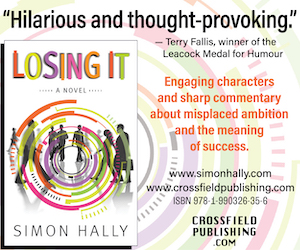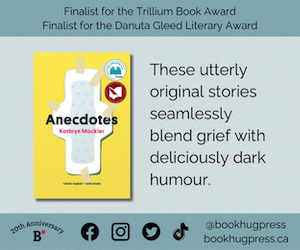"Storytelling is a Core Feature of Jewish Culture" Nora Gold on 10 Years of JewishFiction.Net
Ten years ago, writer Nora Gold started a website. Determined, in a shrinking publishing landscape, to provide a platform for Jewish fiction writers and non-Jewish writers who were exploring Jewish themes, Gold created the appropriately named JewishFiction.net.
The website was and is a celebration of the storytelling tradition knit into the long history of Judaism, publishing established writers and emerging voices side by side. Welcoming readers of any or no faith, Gold has published more than 400 pieces by writers including Elie Wiesel and David Bezmozgis.
She joins us today, fittingly on the final day of Jewish Book Month, to talk about her ten years running the site as a labour of love. She tells us about publishing work in translation from over 15 different languages, shares her favourite kinds of stories to publish, and offers some advice that is valuable for writers sending their work to her publication and many others.
Open Book:
Can you tell us a little bit about how and why JewishFiction.net came to be?
Nora Gold:
This may sound a bit strange because nowadays digital publishing is such a normal part of our lives, but in 2010 when I started Jewish Fiction.net, it was still relatively new, and at that point was causing a crisis in the publishing industry that had a particular impact on Jewish fiction. One effect of the advent of digital technology was that publishers became more reluctant to take on books that they thought of as appealing only to “niche markets,” and Jewish fiction was seen as belonging in this category.
I was able, during this period, to find a publisher for my second book – perhaps because my first one, Marrow and Other Stories, had won an award, as well as praise from Alice Munro – but I knew several good writers of Jewish fiction who, due to the new situation, were unable to get their work published. One author I knew was told by a publisher to just keep her work in a drawer for five to ten years until the industry had adjusted to the digital revolution. As a result, this author considered stopping writing altogether, and I became concerned that during this transitional period a lot of excellent Jewish fiction would be lost. So I started Jewish Fiction.net to create a publishing space for first-rate contemporary Jewish fiction written by authors who were not yet well known. I thought this journal would also be a great vehicle for sharing this literature with the broader literary community in Canada and abroad, so these fine works could be enjoyed and appreciated by both Jewish and non-Jewish readers.
In addition to its literary purpose, JewishFiction.net was created with a social concern in mind. For years I had been dismayed by the divisions, divisiveness, and polarizations within the Jewish world, for example between Jews who were religious/secular, left/right, Ashkenazi/Mizrahi, and Israel/Diaspora. I imagined JewishFiction.net as a literary home where all the different kinds of Jewish voices could be heard, and where the rich diversity of our culture would be showcased and celebrated. To date, JewishFiction.net has published fiction by authors who are secular and religious (“religious” encompassing all the different streams of Judaism), right- and left-wing, Ashkenazi and Mizrahi, old and young, economically privileged and economically disadvantaged, community-affiliated and community-alienated, LGBTQIA and straight, and hailing from Israel and the Diaspora.
This was the why behind JewishFiction.net. As for how it came to be, I was fortunate to already have, in 2010, quite a large network of Jewish writers and scholars, and through it I established a terrific advisory council and team of manuscript reviewers. All the people who became involved in JewishFiction.net had expertise in Jewish literature and were enthusiastic about the idea of this journal. Even before our first issue came out, JewishFiction.net was warmly received throughout the Jewish world, which recognized that we were filling a major lacuna. In 2010 JewishFiction.net was (and it still is) the only English language journal, either print or online, devoted exclusively to publishing Jewish fiction. As a result, we were able to attract, and publish – alongside many promising emerging writers – some of the most eminent figures in contemporary Jewish literature, such as Elie Wiesel, Aharon Appelfeld, Savyon Liebrecht, and A.B. Yehoshua, to name just a few.
When starting JewishFiction.net, I conceived of it as an international journal, not one that would publish only stories written in North American or elsewhere in the English-speaking world. I therefore sought out Jewish authors from five continents, who were writing in many different languages, and I also contacted translators. At present, ten years later, we have published over 400 works of fiction (stories or novel excerpts), never before published in English, that originally were either written in English or translated into English from 15 languages (French, Danish, Spanish, Italian, Serbian, Croatian, German, Russian, Romanian, Turkish, Polish, Hungarian, Yiddish, Ladino, and Hebrew), and we have readers in 140 countries. So JewishFiction.net is truly an international journal. At the same time, I am very proud it is Canadian and based in Toronto, and that we have published some fine Canadian authors, such as George Jonas, Chava Rosenfarb, David Bezmozgis, and Morley Torgov.
OB:
Storytelling seems to be a core tenet of Jewish culture. Is that something you've observed, and if so, what role do you think storytelling plays for Jewish people and writers?
Your CanLit News
Subscribe to Open Book’s newsletter to get local book events, literary content, writing tips, and more in your inbox
NG:
You are definitely correct that storytelling is a core feature of Jewish culture. Our culture has both oral and written traditions, and in both, storytelling is regularly used to inculcate moral and ethical teachings, to transmit Jewish values, and to foster Jewish identity. Regarding our written tradition, Rabbi Lord Jonathan Sacks, the beloved former chief rabbi of the UK who just died, has explicitly connected the Torah (the Five Books of Moses, or the Old Testament) to storytelling: “The Torah is not a theological treatise or a metaphysical system but a series of interlinked stories extended over time… Judaism is less about truth as system than about truth as story [italics his].”
In our oral tradition, as well, storytelling plays a major role. For instance, many Hasidic rabbis told (and tell) stories and parables as a means of educating their community, often relying heavily on metaphor. Storytelling is even a religious obligation in Judaism, during Passover, one of our most important holidays. During Passover, we are required to “tell your children the story” of the exodus from Egypt. To quote Sacks again (now with reference to Passover): “The institution of storytelling is a fundamental religious duty.” Perhaps because of this, many Jews see themselves as characters not only in the stories of their own individual lives, but also in the story of our whole people.
As for how the Jewish storytelling tradition influences Jewish writers specifically, I think it affects all of us at some level, whether consciously or unconsciously. This is visible to me in all the Jewish fiction I read, including the stories we receive at JewishFiction.net. There often seems to be an urgent need to recount some aspect of Jewish historical or contemporary experience, and with this there is a sense that these stories have value not only literarily, but socially and morally. On a personal note, I felt this myself when writing Fields of Exile, my first novel, which explored the moral complexity of pro- and anti-Israel activity on Canadian campuses. Back then I’d never heard Sacks’ phrase “truth as story,” but I think now that with that novel I was expressing this very idea – or maybe even “story as truth.” This, in my view, is typical of many Jewish writers.
OB:
Are there any particularly memorable pieces, for you personally, that have appeared on the site over the years?
NG:
Almost every time I publish a new issue, I have a favourite story from it, so there are too many “special” individual stories to name. But what stands out for me now as memorable are three particular categories of stories that we’ve published. These are:
- Stories that were an author’s very first publication. This always feels special, and quite a few writers whose first publication was with us have gone on to publish successful books, which has been gratifying to see.
- Stories by classic and much loved authors, no longer living, whose work recently received fresh new translations. It’s been very memorable and an honour to publish literary luminaries writers like S.Y. Agnon, Mendele Mokher Seforim, and Isaac Babel.
- All the stories translated from other languages. These hold a special place in my heart, and this whole aspect of JewishFiction.net has been a delightful surprise. Before starting this journal, I knew nothing, for instance, about South American Jewish writing. Discovering the Jewish literatures of fifteen different languages and sub-cultures has been an education and a joy.
OB:
When you evaluate submissions, what are you looking for? Do you have advice you might offer to writers sending out their work for consideration?
NG:
In line with the mandate of our journal, what we look for us first-rate, Jewish-themed fiction. Literary excellence and Jewish content are our only criteria.
Sometimes we get asked if writers have to be Jewish to send us their work, and the answer is a definite no. We have published several excellent, Jewish-themed stories written by non-Jewish authors, and we welcome submissions from anyone who is interested in publishing with us.
As for advice for writers, we recommend that, before sending us their work, they visit our Submissions page for details about our requirements. It is surprising how often we receive submissions that do not meet our criteria. For example, as our name clearly indicates, we are a journal of Jewish fiction, yet we regularly receive submissions of poetry, plays, and even visual art. Writers of Jewish-themed fiction who send us their work can rely on us to take their work seriously. We give careful consideration to every submission we receive and all of them are read, through anonymous review, by at least two reviewers.
OB:
JewishFiction.net is free to readers. How do you manage to maintain this accessibility and why is it an important aspect of the publication for you?
NG:
When I was just beginning to create this journal and imagining different ways it might operate, I happened to pass a group of Jewish high school students at a bus stop near the school my son used to attend, and I thought: I want these kids reading JewishFiction.net, too! So from the get-go, it was a matter of principle that this journal would be free of charge and therefore accessible to everyone, regardless of financial situation. I suppose the underlying reason this is so important to me is that I have always conceived of JewishFiction.net not as a business venture but as a cultural resource (perhaps even a cultural treasure).
I have managed to keep JewishFiction.net universally accessible thanks to the generosity of our donors. This journal subsists entirely on donations from our readers (Canadian and American donations are tax-deductible), and thus far our readers have been very appreciative and supportive. The other factor making it possible to provide this journal free of charge is the fact that everyone who works on JewishFiction.net (other than our website technician and lawyer) does so on a volunteer basis, me included. JewishFiction.net is a labour of love and this is part of our strength. It has allowed us to maintain our editorial independence since we are not beholden to any foundation or organization, and unlike many publications (literary or not) that have been forced to close recently because their funding sources dried up, we are not vulnerable in this way. There is also a feeling among everyone involved with JewishFiction.net (at present, we have reviewers in three geographical hubs: Toronto, Houston, and Jerusalem) that, while we are financially unremunerated, we are richly remunerated in other ways, including intellectually, spiritually, and socially. During these first ten years, I have sometimes thought of JewishFiction.net as a gift from me to the world, but I have also received from it many gifts in return.
OB:
What does reaching ten years mean to you? And what do you see or hope for the future of JewishFiction.net?
NG:
The tenth anniversary of JewishFiction.net brings with it a sense of great accomplishment and pride, not least in the current context where so many publications (including Jewish newspapers and magazines) have been unable to survive. When I began JewishFiction.net, I had no idea it would become what it has, either quantitatively (over 400 works of original fiction published; readers in 140 countries) or qualitatively (in terms of its prominence and significance in the international Jewish literary world). I am very grateful for our success to date, which I share wholeheartedly with our amazing team of reviewers and our advisory council.
Looking forward, I would like to expand the base of our readership, publish translations from languages we have not yet published, and find a way, in the coming decade, to ensure the long term sustainability of this journal, both monetarily and organizationally. I look forward to the next ten years of JewishFiction.net, and continuing to provide our readers with illumination, entertainment, intellectual stimulation, and pleasure, including during this challenging time we are all living through now.
______________________________________________________________
Dr. Nora Gold is the prize-winning author of three books: The Dead Man (2016), Fields of Exile (2014), and Marrow and Other Stories. She is a two-time winner of the Canadian Jewish Literary Award.
In addition, Gold is the founder and editor of the prestigious online literary journal JewishFiction.net, currently celebrating its 10th anniversary. Jewish Fiction .net has published over 430 works of fiction from around the world (originally written in 16 languages), and it has readers in 140 countries.
From 1990-2000 Dr. Gold was a tenured professor of social work. She left full-time academia in 2000, and for the next eighteen years was affiliated (first as an Associate Scholar and then for six years as its Writer-in-Residence) with OISE/University of Toronto’s Centre for Women’s Studies in Education. This centre closed in 2018, but Gold continues to coordinate the highly-regarded reading series that she established there, the Wonderful Women Writers Series, now housed at the Toronto Public Library (Deer Park Branch).
In terms of her activism, Dr. Gold is a co-founder of both the New Israel Fund of Canada and Canadian Friends of Givat Haviva, and she is the founder of JSpaceCanada.



